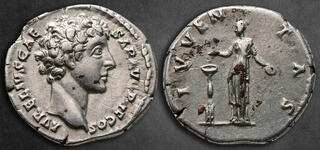Lot description:
Marcus Aurelius, as Caesar AD 139-161. Rome
Denarius AR
18 mm, 3,23 g
AVRELIVS CAESAR AVG PII F COS, bare head right / IVVENTAS, Juventas standing left, holding patera and dropping grains of incense on candelabrum to left.
Good Very Fine
RIC 423a (Antoninus Pius).
Marcus Aurelius Antoninus was a Roman emperor and Stoic philosopher, was a pivotal figure of the Nerva–Antonine dynasty, renowned as the Five Good Emperors. His reign, from AD 161 to 180 AD, marked the pinnacle of the Pax Romana, an era of relative stability for the Roman Empire. Co-ruling with Lucius Verus, he confronted challenges like conflicts with the Parthian Empire and Germanic tribes. Born into privilege, Marcus was educated by prominent tutors and married Faustina. His reign witnessed the devastating Antonine Plague, impacting the empire's population. His "Meditations," a collection of philosophical writings, remains influential and illuminates his commitment to Stoic ideals. Unlike his predecessors, Marcus refrained from adopting an heir. His descendants included Lucilla, who married Lucius, and Commodus, whose controversial succession sparked debates. The Column and Equestrian Statue of Marcus Aurelius, both located in Rome, commemorate his military triumphs.
Beyond his imperial role, Marcus's legacy as a philosopher-king endures. His insights into Stoicism continue to inspire modern thinkers, admired by writers, philosophers, and leaders over the centuries. In navigating the complexities of governance, philosophy, and legacy, Marcus Aurelius left an indelible mark on Roman history and the broader understanding of leadership and ethical principles.
Starting price: 50 EUR |  |